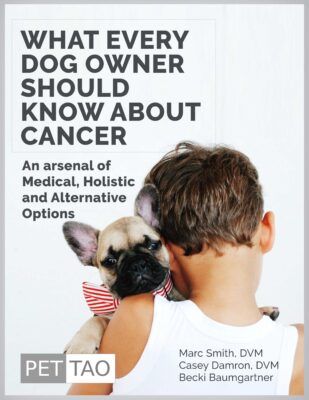Dog cancer is a serious matter! Our free ebook, “What Every Dog Owner Should Know About Cancer,” will help you discover options for your dog’s cancer.
Written by Holistic TCVM Veterinarians Dr. Marc Smith and Dr. Casey Damron, this resource is tailored for pet parents like you. With over 20 years of veterinary experience, they provide medical, holistic, and alternative solutions, prioritizing your beloved pet’s health and well-being.
For A Limited Time Only – Dog Cancer Ebook Free Instant Download
 WHAT EVERY DOG OWNER SHOULD KNOW ABOUT CANCER: An Arsenal of Medical, Holistic, and Alternative Options
WHAT EVERY DOG OWNER SHOULD KNOW ABOUT CANCER: An Arsenal of Medical, Holistic, and Alternative Options
Does your dog suffer from cancer? If so, help has arrived! Download your free ebook now and:
- Gain Insight: Discover essential information about the various types and stages of canine cancer, enabling you to understand what your dog is experiencing.
- Explore Solutions: Learn about various approaches to combating and preventing cancer, including dietary adjustments, herbal remedies, and alternative therapies.
- Strengthen Connection: Deepen your bond with your beloved pet by understanding their journey and emotions, fostering empathy and support.
- Take Control: Empower yourself with the knowledge and resources to improve your dog’s quality of life, regardless of the cancer type or stage. This will ensure you and your pet feel empowered and equipped for the road ahead.
Importance of Consulting with Your Vet
Facing a canine cancer diagnosis can feel overwhelming, but remember, you’re not alone. Your veterinarian is your ally in this journey.
They’re trained to spot cancer signs and perform tests to confirm them, paving the way for early detection and better outcomes for your furry friend.
Lean on your vet for support and guidance every step of the way. They’ll empower you with the knowledge to make informed decisions about your pet’s treatment and care, ensuring the best possible quality of life.
Staying Informed
Taking the best care of your beloved furry companion involves being proactive about understanding dog cancer. You can better protect your pet’s health by knowing about breed tendencies, environmental influences, and genetic predispositions.
Learning about the signs and symptoms of cancer puts you in a position to detect any potential issues early on, ensuring your dog receives prompt medical attention. Additionally, staying up-to-date on the latest advancements in treatment gives you the knowledge to consider all available options for your dog’s happiness and health.
Types of Cancer
Cancer can affect dogs of all breeds and ages, and various types of cancer can manifest in our furry friends. Staying informed about these different types is essential for early detection and effective treatment. Here are some common types of cancer seen in dogs:
-
Lymphoma: This is one of the most common types of cancer in dogs, affecting the lymphatic system and causing swelling of the lymph nodes.
-
Mast Cell Tumors: Mast cell tumors arise from a type of white blood cell and can occur on the skin or in internal organs. They vary widely in severity, from benign to highly malignant.
-
Osteosarcoma: Osteosarcoma is a bone cancer commonly affecting large and giant breed dogs. It typically occurs in the long bones of the legs and can be highly aggressive.
-
Hemangiosarcoma: This cancer originates from cells that line blood vessels and can occur in various organs, including the spleen, liver, and heart. Hemangiosarcoma is often diagnosed late and carries a poor prognosis.
-
Mammary Gland Tumors: Mammary gland tumors are common in unspayed female dogs. They can be benign or malignant and often require surgical removal.
-
Melanoma: Melanoma is a type of skin cancer that can also affect the mouth and eyes of dogs. It can be benign or malignant and may require surgery and other treatments.
-
Squamous Cell Carcinoma: This type of cancer commonly affects the skin, especially in areas exposed to sunlight, such as the ears, nose, and belly. It can be locally invasive and metastasize to other body parts.
Dive deeper into the topic by grabbing your copy of our ebook on dog cancer.
People Also Ask:
-
What are the signs of canine cancer?
- Signs of cancer in dogs can vary depending on the type and location of the tumor. Common signs include lumps or bumps, swelling, unexplained weight loss, changes in appetite, difficulty breathing, lethargy, and abnormal bleeding or discharge. It’s essential to consult with a veterinarian if you notice any unusual symptoms in your dog.
-
How is cancer diagnosed in dogs?
- Cancer in dogs is diagnosed through physical examination, imaging tests such as X-rays and ultrasound, blood tests, and tissue biopsy. If a veterinarian suspects cancer based on clinical signs or initial tests, they may recommend further diagnostic procedures to confirm the diagnosis and determine the type and stage of cancer.
-
What treatment options are available for dog cancer?
- Treatment options for dogs with cancer depend on various factors, including the type of cancer, its stage, and the dog’s overall health. Common treatment modalities include surgery, chemotherapy, radiation therapy, immunotherapy, and palliative care to manage symptoms and improve quality of life. A veterinary oncologist will determine The best treatment approach based on individual circumstances and the specific characteristics of the cancer.







